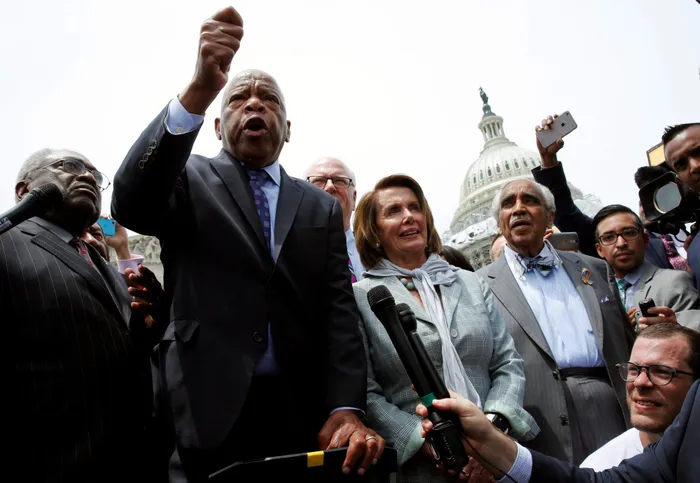Twenty groups demand Bowman amendment to disclose cost of US military footprint

Picture: Yuri Gripas/REUTERS/taken on June 23, 2016 – US Georgia Democratic Party Representative John Lewis, second left, talks to supporters along with House Democrats after their sit-in over gun-control law on Capitol Hill in Washington, US, June 23, 2016. The Bowman amendment to disclose the cost of US military footprint, which has its roots in the 2015 Cost of War Act led by former late Congressman John Lewis, “is crucial as taxpayers and other citizens remain concerned — and inadequately informed — about the cost to US taxpayers of the wide range of US military activities abroad”, the writer says.
By Jessica Corbett
US legislators remain on August recess but 20 advocacy groups on Monday wrote to top Democrats and Republicans on key congressional panels to demand passage of “commonsense, noncontroversial” legislation to provide the public with greater transparency on US military spending.
When members of Congress return to Capitol Hill next month, they will continue reconciling the differences between the House and Senate versions of the National Defence Authorisation Act (NDAA) for Fiscal Year (FY) 2024 — a process that involves intense disagreements over right-wing policies that Republicans want to stuff into the $886 billion package.
The advocacy organisations — including Amnesty International USA, Demand Progress Action, Friends Committee on National Legislation, Just Foreign Policy, Peace Action, RootsAction.com, Veterans for Peace, and Win Without War — came together to support an amendment to the NDAA proposed by Representative (Rep) Jamaal Bowman, Democrat-New York (D-NY).
Writing to Senate Armed Services Committee Chair Jack Reed (D-Rhode Island) and Ranking Member Roger Wicker (Republican-Mississippi) and House Armed Services Committee Chair Mike Rogers (R-Alabama) and Ranking Member Adam Smith (D-Washington), the groups explained how Bowman’s proposal has its roots in the 2015 Cost of War Act led by former Congressman John Lewis (D-Georgia).
Last year, the late congressman’s successor, Rep Nikema Williams (D-Ga), “carried forward this legacy by introducing new Cost of War legislation expanding the scope of John Lewis’ work to include the cost to US taxpayers for any overseas contingency operations”, the letter notes, arguing that its inclusion in a previous NDAA “demonstrates the broad-based support for accountability and transparency around US defence spending”.
GOP leadership blocked the House from even holding a vote on Pentagon cuts — lets see if they will even allow Americans to know what we're actually spending on our massive, destructive military presence overseas https://t.co/QLXdKdLRYn
— aída chávez (@aidachavez) August 28, 2023
For the FY23 NDAA, Bowman introduced “the latest update to John Lewis’ Cost of War legislation,” an amendment that “requires reporting on a wider range of costs to fully encompass the US military footprint abroad that is not covered by the former two pieces of legislation”, the letter details. “This includes the price of training and assisting partner forces, maintaining overseas bases, paying contractors who provide goods and services in support of operations, and all overseas military operations.”
Bowman’s measure passed the House but was ultimately left out of the final NDAA. The groups behind the letter to panel leaders now hope it will remain included in the next one, writing that “this amendment is crucial as taxpayers and other citizens remain concerned — and inadequately informed — about the cost to US taxpayers of the wide range of US military activities abroad, including those that fall short of active military missions such as wars or contingency operations.”
“Many Americans want great public scrutiny and debate about the balance our nation strikes between spending on our military presence abroad and spending on other domestic priorities,” the groups stressed. “This includes spending on healthcare, education, and infrastructure, as well as concerns about the rate of taxation or national debt required to sustain the US overseas presence.”
“These debates will only become more relevant as our military budget approaches the $1 trillion mark,” the organisations added, “and it is important that the American people have the necessary transparency and data about these costs to engage in our nation’s democratic decision-making process around such questions.”
Jessica Corbett is a Common Dreams senior editor and staff writer
This article was first published on Common Dreams
Related Topics: